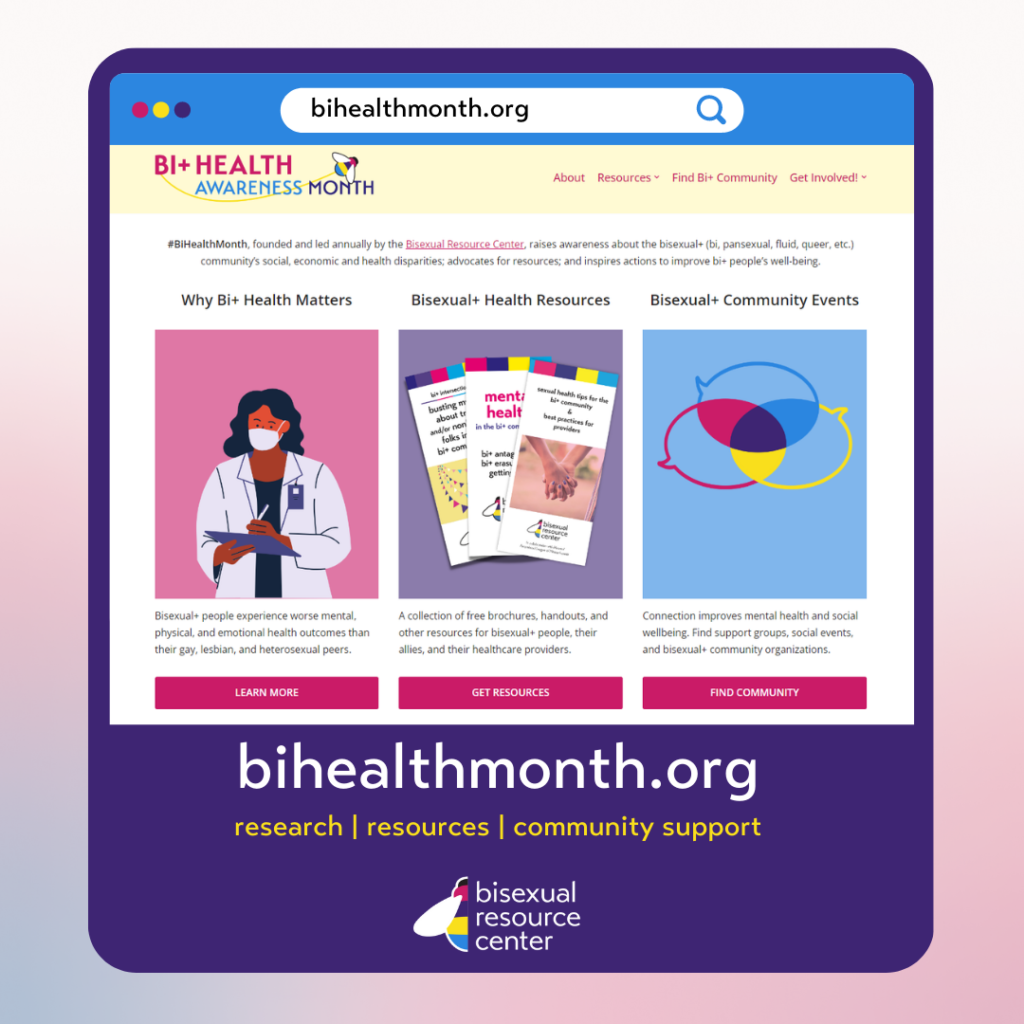The 2026 Bi+ Health Awareness Month theme, Claiming the Right to Care as Bi+ People, affirms a core principle: bi+ people are entitled to competent, affirming, and accessible healthcare without having to justify their identities, minimize their needs, or accept inadequate treatment.
Want your materials included in this share kit, to be added to the list of official #BiHealthMonth partners, ask questions, or write a guest post? E-mail us at bham@biresource.org.
Ways to Participate
- Share #BiHealthMonth graphics and messages on social media
- Attend and promote our free virtual events
- Educate providers and allies about bi+ health disparities
- Advocate for inclusive healthcare policies
Key Facts & Talking Points
- Bisexual+ people make up the majority of the LGBTQ community, but receive less than 1% of all funding that supports LGBTQ advocacy, and they experience significantly higher rates of physical, sexual, social and emotional violence and disparities than gay and straight people, as well as poorer physical, mental and social health.
- Bisexual+ people often experience higher levels of mental health distress than their gay and straight peers, including suicidality, substance use disorders, depression and anxiety. It’s important to connect with bisexual-specific and -inclusive resources, programs and services that can best serve bi+ people’s mental health needs.
- Despite bisexual+ people comprising over half of the LGBTQ community, only 29% of people report personally knowing a bisexual+ person, compared to 73% of people who report knowing a gay or lesbian person. As a result, media representation of bisexuality+, which is often harmful and reductive, heavily shapes the general public’s perception of who bisexual+ people are and perpetuates dangerous stereotypes.
- Bisexual+ youth are less likely than their gay peers to be out to their loved ones, but account for 8% of 18-34 year olds; whereas gay and lesbians only account for 3% of that age bracket. They’re also less likely to attend queer youth groups. It’s vital for schools and youth spaces to be bi+ affirming and welcoming in order to best serve LGBTQ young people.
- 37% of gender-expansive youth are verbally harassed at school, and another report found 44% of bisexual youth were bullied about their weight or physical appearance one or more times during the past month. A report by the GSA Network chronicles harsh discipline and school push-out often faced by LGBTQ youth of color. It’s important to build safer, more inclusive and accepting environments for bisexual+ (e.g. bisexual, pansexual, queer, fluid, no label) youth in schools.
- Among youth, bisexuality was associated with a history of forced or unwanted sex among female high school students, and compared with gay male youth, bisexual male youth were 5.4 times as likely to have been threatened with outing by a date or partner.
Suggested Social Media Copy
- In an uncertain world, bi+ people deserve certainty in healthcare. No one should have to fear discrimination when seeking care. #BiHealthMonth is a call to action—let’s fight for accessible, affirming healthcare for all.
- As attacks on LGBTQ+ rights rise, bi+ and trans communities are standing together to demand health justice. We won’t be erased, and we won’t be ignored. #BiHealthMonth
- From insurance denials to biased providers, bi+ people face countless barriers to care. Healthcare should be a right, not a privilege. Join us in the fight for bi+ health equity. #BiHealthMonth
- The fight for bi+ health is the fight for trans rights. Our communities are intertwined, and our health justice must be too. This #BiHealthMonth, we demand affirming care for all.
- Want to learn more about supporting the #bisexual+ community this #BiHealthMonth? Check out the free resources available at bihealthmonth.org
- Health is physical, as well as social, emotional, social, sexual and spiritual. This #BiHealthMonth, we’re helping @BRC_Central spotlight all aspects of #bisexual+ people’s well-being. Visit bihealthmonth.org for more information and free health resources for bisexual+ people!
- More than half of trans people identify as bi+. When trans rights are attacked, bi+ people are directly impacted. Health justice is collective justice. #BiHealthMonth
- Navigating healthcare as a bi+ person shouldn’t feel like an uphill battle. We need affirming providers, inclusive policies, and real support. This #BiHealthMonth, let’s push for change.
- Bisexual+ people are the majority of the LGBTQ community, but we don’t get the same research and resources and attention as our gay and straight peers. You can help support bi+ programs and research by joining the Visibility Impact Fund! #VisibilityImpactFund #BiHealthMonth https://www.visibilityimpactfund.org/
Graphics to Share
